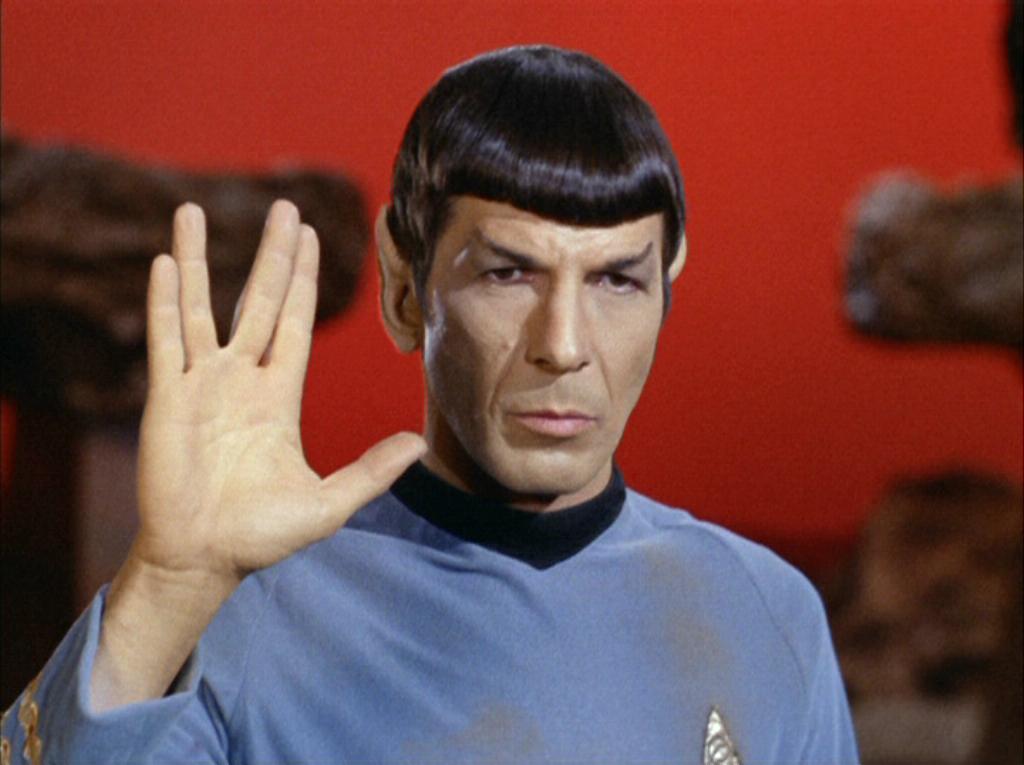Monday, September 29, 2014
A Priestly Blessing from the planet Vulcan
It’s often said that religion and science don’t mix, nor should they.
And to a certain extent, I agree with that philosophy.
We should never let our religious beliefs stop us from exploring how and why things work in our universe nor should we ever alter the results of those scientific explorations just because they don’t happen to fit in with the precepts of our religion. Conversely, we should never let what we learn from science influence our belief in G-d.
Yet the same cannot be said when it comes to science fiction stories.
Some of the best Sci-Fi out there deals with the inherent conflict between these opposing points of view: faith and science. It has also, at least in my mind, given us one of the most iconic symbols in all of science fiction; the Vulcan hand salute and its salutation, “Live long and prosper.”
As some may or may not know, the now famous gesture was created by “Star Trek” actor Leonard Nimoy, during the filming of the episode “Amok Time.”
“I peeked. And I saw them with theirs hands stuck out beneath their Tallit like this toward the congregation and I went: Wow! Something really got hold of me. I had no idea of what was going on, but the sound of it and the look of it was magical.”
Who knew that only 20 or so years later, Nimoy would turn that “secret” Jewish ritual into a cultural phenomena?
I’ve known about the origins of the Vulcan salute for sometime now, but what got me thinking about it again was trying to come up with an idea for this month’s blog entry, which would fall right between Rosh Hashanah, the Jewish New Year and Yom Kippur, our Day of Repentance.
I can still remember the day I first saw my rabbi perform this ritual. I was in seventh grade and in our synagogue’s junior choir. We were singing as part of the big family service on Yom Kippur and we were standing off to the side and a bit behind the bema, or stage from where the Torah is read. Since we were on risers and already facing away from him, it was a bit hard for us to turn around when the rabbi asked, but like the young Leonard Nimoy, I just couldn’t resist peeking as our rabbi intoned the blessing that asks G-d to inscribe us for yet another in year in the book of life and grant us peace and prosperity.
My mind was blown as I saw him reaching out toward the crowd with his hands held in the to-me familiar “vee” fingered formation.
“My G-d,” I thought. “He’s essentially wishing us all ‘Peace and long life’ and asking G-d to ensure that the Jewish people, ‘live long and prosper.’ ”
“My G-d,” I thought again. “Vulcans are space Jews!”
If Mr. Spock hadn’t been my favorite “Star Trek” character before then (and he was), he became it right then and there. Over the years I came to realize that the Vulcan philosophy as depicted on the show isn’t all that different from what we Jews ask G-d’s help in becoming every year during these holiest of days. We seek to become a better people. A people who embrace cultural and racial diversity. A people devoted to learning. A people yearning for peace. And a people who act on the belief that ‘the needs of the many outweigh the needs of the few or one’ by going out and doing “mitvahs” or good deeds to leave the world a better place than the way in which we found it.
So in the spirit of both the Vulcan and Jewish people, I’d like to wish all of you out there in cyberspace, a slightly modified version of the Birkat Kohanim:
May G-d bless you and guard you.
May G-d shine His countenance upon you and be gracious to you.
May G-d turn His countenance toward you and grant you peace.
And may you all Live, Long and Prosper.
Subscribe to:
Comments (Atom)

